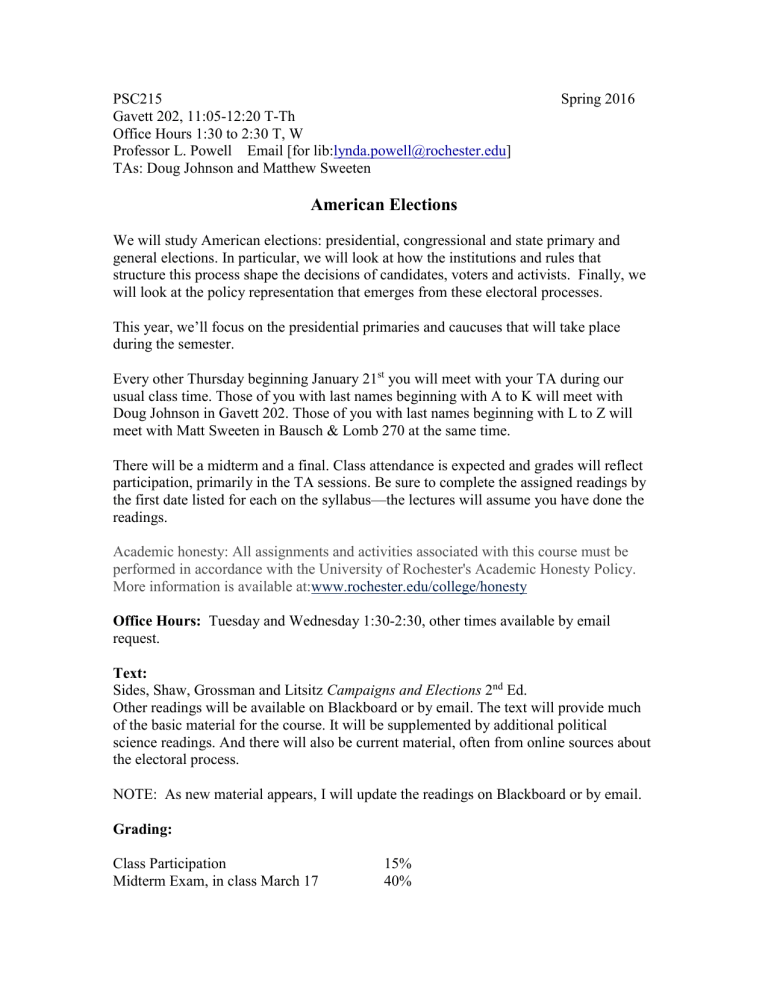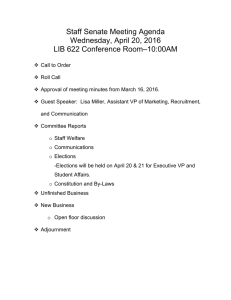PSC215 Spring 2016 Gavett 202, 11:05-12:20 T-Th

PSC215
Gavett 202, 11:05-12:20 T-Th
Office Hours 1:30 to 2:30 T, W
Spring 2016
Professor L. Powell Email [for lib: lynda.powell@rochester.edu
]
TAs: Doug Johnson and Matthew Sweeten
American Elections
We will study American elections: presidential, congressional and state primary and general elections. In particular, we will look at how the institutions and rules that structure this process shape the decisions of candidates, voters and activists. Finally, we will look at the policy representation that emerges from these electoral processes.
This year, we’ll focus on the presidential primaries and caucuses that will take place during the semester.
Every other Thursday beginning January 21 st
you will meet with your TA during our usual class time. Those of you with last names beginning with A to K will meet with
Doug Johnson in Gavett 202. Those of you with last names beginning with L to Z will meet with Matt Sweeten in Bausch & Lomb 270 at the same time.
There will be a midterm and a final. Class attendance is expected and grades will reflect participation, primarily in the TA sessions. Be sure to complete the assigned readings by the first date listed for each on the syllabus—the lectures will assume you have done the readings.
Academic honesty: All assignments and activities associated with this course must be performed in accordance with the University of Rochester's Academic Honesty Policy.
More information is available at: www.rochester.edu/college/honesty
Office Hours: Tuesday and Wednesday 1:30-2:30, other times available by email request.
Text:
Sides, Shaw, Grossman and Litsitz Campaigns and Elections 2 nd
Ed.
Other readings will be available on Blackboard or by email. The text will provide much of the basic material for the course. It will be supplemented by additional political science readings. And there will also be current material, often from online sources about the electoral process.
NOTE: As new material appears, I will update the readings on Blackboard or by email.
Grading:
Class Participation
Midterm Exam, in class March 17
15%
40%
Final Friday, May 6, 8:30 AM
Writing section students:
Class Participation
Midterm Exam
Final Friday, May 6, 8:30 AM
Paper
45%
10%
35%
40%
15%
There will be a separate email sent to W students about the paper requirements.
Introduction. Jan 14 (Th)
Partisanship—Voters and Electorates.
Jan 19 (T)
[1] Campaigns & Elections , Ch 2, 13 & 14.
[2] Kondik, Skelley and Sabato, “The 2016 Results We Can Already Predict” Politico
May 3, 2015. [Note to lib link: http://www.politico.com/magazine/story/2015/05/2016predictions-117554]
[3] Feller, Gelman and Shor, “Red State/Blue State Divisions in the 2012 Presidential
Election”
The Forum, 2012, 10(4): 127-131. [note to lib: de Gruyter press]
Find information about, think about and be prepared to discuss the following:
What does the term turnout mean and why should we care about levels of turnout?
What do we mean by party identification?
How do voters use party identification?
Do voters know enough to vote for the candidate who best represents their views? Can party identification help?
Now let’s think about the partisanship of constituencies. For example, we talk about red states and blue states. Why is it important to understand such aggregate partisanship as well as individual level partisanship?
Presidential Primaries and Caucuses. Jan 26 (T) and Jan 28 (Th).
[1] Campaigns & Elections , Ch 9, pp 236-252.
[2] Putnam, “Everything you need to know about how the presidential primary works”
Monkey Cage May 12, 2015. [for lib: https://www.washingtonpost.com/blogs/monkeycage/wp/2015/05/12/everything-you-need-to-know-about-how-the-presidential-primaryworks/ ]
[3] NYT Presidential Primary Calendar [for lib:http://www.nytimes.com/interactive/2016/us/elections/primary-calendar-andresults.html?_r=0]
[4] Frontloading HQ Presidential Primary Calendar—the details [for lib: http://frontloading.blogspot.com/p/2016-presidential-primary-calendar.html
]
[5] The Upshot, “Who’s Winning the Presidential Campaign?” The New York Times, Jan
5, 2016. [for lib: http://www.nytimes.com/interactive/2016/us/elections/presidentialcandidates-dashboard.html?rref=upshot]
[6] Bycoffe, “The Endorsement Primary” 538.com [for lib: http://projects.fivethirtyeight.com/2016-endorsement-primary/ ]
[7] Real Clear Politics: Republican [for lib: http://www.realclearpolitics.com/epolls/2016/president/us/2016_republican_presidential_ nomination-3823.html
] and Democratic [for lib: http://projects.fivethirtyeight.com/2016endorsement-primary/ ] current nomination poll results.
[8] Center for Responsive Politics, Presidential nomination fundraising. [for lib: https://www.opensecrets.org/pres16/]
[9] Byron Shafer and Amber Wichowsky “Institutional Structure and Democratic Values:
A Research Note on a Natural Experiment” The Forum Vol 7 Issue 2 2009.
[10] Brian Arbour “Even Closer, Even Longer: What If the 2008 Democratic Primary
Used Republican Rules?”
The Forum Vol 7 Issue 2 2009.
Find information about, think about and be prepared to discuss the following:
What factors do potential presidential candidates think about when deciding whether or not to run? Think about the ones that are personal to them, as well as the features of the electoral landscape that will shape the decisions of any potential candidate.
What are “core supporters” and why are they important?
How do caucuses work?
What are the pros and cons of caucuses versus primaries?
What is frontloading and what are its pros and cons?
In the period before the actual presidential primaries and caucuses were held, “the invisible primary,” which candidates held the polling lead, raised the most money and/or had the most endorsements?
Describe the arguments for and against a few small states, such as IA and NH being allowed to hold their nomination contests before the rest of the states. Have these states contributed to or detracted from a democratic presidential nomination process?
In what ways does the sequence of primaries matter?
In what ways were this year’s primaries different or the same compared to 2008 or 2012 primaries? Why so?
House Districts, Apportionment and Redistricting. Feb 2 (T).
[1] Streb, Rethinking American Electoral Democracy , Ch 7.
[2] Masket, Winburn & Wright “The Gerrymanderers are Coming! Legislative
Redistricting Won’t Affect Competition or Polarization Much, No Matter Who Does It.”
PS Jan. 2012.
[3] Rutenberg, “Block the Vote”, New York Times Magazine , Dec. 20, 2015.
[4] Miller and Grofman, “Redistricting Commissions in the Western United States.” UC
Irvine Law Review, 2013, Volume 3, Article 9. [for lib: http://scholarship.law.uci.edu/cgi/viewcontent.cgi?article=1093&context=ucilr]
[5] Burns, “Supreme Court to hear challenge to Texas redistricting plan” Washington
Post , May 26, 2015. [For lib: https://www.washingtonpost.com/politics/courts_law/supreme-court-to-hear-texasredistricting-case/2015/05/26/ab0c9c80-03b4-11e5-8bda-c7b4e9a8f7ac_story.html]
Find information about, think about and be prepared to discuss the following:
What is redistricting and why should we care about it?
Who does redistricting? Why does it matter?
What is gerrymandering? For the country as a whole, does either party gain a net advantage because of gerrymandering?
What is the California process? Do commissions produce “better” redistricting? What might better mean?
In what ways other than redistricting do elected officials try to “choose their voters”?
House and Senate Primary Elections. Feb 9 (T) and Feb 11 (Th).
[1] Campaigns and Elections , Ch 10, pp 274-286.
[2] Boatwright, “No Primaries Aren’t Destroying Politics.” Politico Feb. 18, 2014. [for lib: http://www.politico.com/magazine/story/2014/02/primaries-arent-destroyingamerican-politics-103633]
[3] Bawn, Cohen, Karol, Masket, Noel and Zaller, "A Theory of Political Parties: Groups,
Policy Demands and Nominations in American Politics" Perspectives on Politics , 2012.
[4] Williamson, Skocpol and Coggin, "The Tea Party and the Remaking of Republican
Conservatism" Perspectives on Politics , 2011.
[5] Intorcio, “How Does California’s “Top Two” Primary Law Compare to Primary
Elections in Other States?” The Thicket , the blog of the National Conference of State
Legislators, June 30, 2010. [for lib: http://ncsl.typepad.com/the_thicket/2010/06/howdoes-californias-top-2-primary-law-compare-to-primary-elections-in-other-states.html]
[6] Caen, “The Consequences of California’s Top-Two Primary.” The Atlantic, Dec 29,
2015. [for lib: http://www.theatlantic.com/politics/archive/2015/12/california-top-twoopen-primary/421557/ ]
[7] The Times Editorial Board, “California’s top-two primary: Don’t judge too quickly.”
LA Times , February 9, 2015. [for lib: http://www.latimes.com/opinion/editorials/la-edtop-two-primary-california-20150210-story.html]
Find information about, think about and be prepared to discuss the following:
What is a primary?
What are closed and open primaries? Do open primaries tend to nominate different kinds of candidates than closed? If so how are they different and why? What are the other pros and cons of these two general types?
Why do so few incumbents typically lose in primaries?
How can we identify the “best” primary rules to use?
Measuring Public Opinion—What Does Polling Reveal?
Feb 16 (T)
[1] Hillygus, “The Evolution of Election Polling in the United States.” Public Opinion
Quarterly , 2011. [for lib: http://hbanaszak.mjr.uw.edu.pl/TempTxt/Hillygus_2011_The%20Evolution%20of%20El ection%20POlling%20in%20the%20United%20States.pdf}
[2] Five Thirty Eight. Pollster Ratings [for lib:http://fivethirtyeight.com/interactives/pollster-ratings/]
[3] Sides, “Do Early Polls Predict Anything?”
The Monkey Cage, Washington Post , May
25, 2011. [For lib: http://themonkeycage.org/2011/05/25/do-early-polls-predictanything/ ]
[4] Using Real Clear Politics [for lib: www.realclearpolitics.com
]
[5] Irwin, “How is the Economy Doing? It may depend on your party and $1”, The
Upshot, NYT, Jan 1, 2016. [for lib: http://www.nytimes.com/2016/01/03/upshot/how-isthe-economy-doing-politics-may-decide-your-answer.html?rref=upshot]
Find information about, think about and be prepared to discuss the following:
Who uses polling and why?
Why should we care about polling?
Why do poll results vary so much? How is it possible for one firm to report one candidate is ahead 54% to 40% while another reports that they are tied?
How can you evaluate the quality of a poll that is reported?
How honest are the answers in a poll?
Look at the over-time chart for presidential job approval, congressional job approval, generic congressional vote and direction of country on Real Clear Politics or any similar website.
The next third of the readings will be posted shortly.
